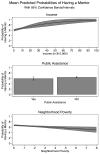How Economic Disadvantage Affects the Availability and Nature of Mentoring Relationships During the Transition to Adulthood
- PMID: 29400907
- PMCID: PMC5837955
- DOI: 10.1002/ajcp.12228
How Economic Disadvantage Affects the Availability and Nature of Mentoring Relationships During the Transition to Adulthood
Abstract
Supportive nonparental adults, particularly nonfamilial adults, provide critical support during the transition to adulthood, opening doors to educational and career paths. This study examined whether economic disadvantage shapes access to these relationships. Results showed that low-income adolescents had reduced access to naturally occurring mentors, and the relationships they did form tended to be close bonds with family and friends, rather than nonfamilial adults. Their mentors were more likely to focus on practical support, and less likely to serve as role models or provide career advice. These effects of socioeconomic status on natural mentoring relationships remained evident, even when accounting for youth race/ethnicity. Findings suggest that networks of support differ depending on a youth's socioeconomic context in ways that could perpetuate social and economic inequalities.
Keywords: Add Health; Longitudinal; Mentoring; Poverty.
© Society for Community Research and Action 2018.
Conflict of interest statement
Conflict of Interest Disclosure
The authors have no conflicts of interest to disclose.
Figures

Similar articles
-
It's Who You Know That Matters: Identifying Which Type of Informal Mentor Is Most Likely to Promote Economic Mobility for Vulnerable Youth.J Prim Prev. 2021 Jun;42(3):217-238. doi: 10.1007/s10935-021-00630-7. Epub 2021 Mar 30. J Prim Prev. 2021. PMID: 33783674
-
The Long-Term Impact of Natural Mentoring Relationships: A Counterfactual Analysis.Am J Community Psychol. 2018 Sep;62(1-2):175-188. doi: 10.1002/ajcp.12265. Epub 2018 Jul 30. Am J Community Psychol. 2018. PMID: 30058721
-
Appraisal Support from Natural Mentors, Self-worth, and Psychological Distress: Examining the Experiences of Underrepresented Students Transitioning Through College.J Youth Adolesc. 2018 May;47(5):1100-1112. doi: 10.1007/s10964-017-0798-x. Epub 2017 Dec 27. J Youth Adolesc. 2018. PMID: 29282606
-
One of these things is not like the other: Predictors of core and capital mentoring in adolescence.Am J Community Psychol. 2023 Jun;71(3-4):257-273. doi: 10.1002/ajcp.12627. Epub 2022 Nov 1. Am J Community Psychol. 2023. PMID: 36317388 Review.
-
Mentoring programs for adolescents: a research summary.J Adolesc Health. 2002 Dec;31(6 Suppl):251-60. doi: 10.1016/s1054-139x(02)00498-6. J Adolesc Health. 2002. PMID: 12470922 Review.
Cited by
-
Helping me helps us: The role of natural mentors in the ethnic identity and academic outcomes of Latinx adolescents.Dev Psychol. 2020 Feb;56(2):208-220. doi: 10.1037/dev0000878. Epub 2019 Dec 19. Dev Psychol. 2020. PMID: 31855014 Free PMC article.
-
Youth Initiated Mentoring: A Meta-analytic Study of a Hybrid Approach to Youth Mentoring.J Youth Adolesc. 2021 Feb;50(2):219-230. doi: 10.1007/s10964-020-01336-5. Epub 2020 Oct 29. J Youth Adolesc. 2021. PMID: 33123946
-
It's Who You Know That Matters: Identifying Which Type of Informal Mentor Is Most Likely to Promote Economic Mobility for Vulnerable Youth.J Prim Prev. 2021 Jun;42(3):217-238. doi: 10.1007/s10935-021-00630-7. Epub 2021 Mar 30. J Prim Prev. 2021. PMID: 33783674
-
Collective Efficacy as a Key Context in Neighborhood Support for Urban Youth.Am J Community Psychol. 2019 Mar;63(1-2):179-189. doi: 10.1002/ajcp.12311. Am J Community Psychol. 2019. PMID: 30843253 Free PMC article.
-
Predicting Contribution in High Achieving Black and Latinx Youth: The Role of Critical Reflection, Hope, and Mentoring.Front Psychol. 2021 Jul 7;12:681574. doi: 10.3389/fpsyg.2021.681574. eCollection 2021. Front Psychol. 2021. PMID: 34305734 Free PMC article.
References
-
- Angel R, Tienda M. Determinants of extended household structure: Cultural pattern or economic need? American Journal of Sociology. 1982;87(6):1360–83. http://doi.org/10.1086/227597. - DOI
-
- Arnett JJ. Emerging adulthood: A theory of development from the late teens through the twenties. American Psychologist. 2000;55:469–480. - PubMed
-
- Beam MR, Chen C, Greenberger E. The nature of adolescents’ relationships with their “very important” nonparental adults. American Journal of Community Psychology. 2002;30(2):305–325. - PubMed
-
- Brooks-Gunn J, Duncan GJ. The effects of poverty on children. The Future of Children. 1997;7:55–71. - PubMed
-
- Bruce M, Bridgeland J. The mentoring effect: Young people’s perspectives on the outcomes and availability of mentoring. Washington, D.C: Civic Enterprises with Hart Research Associates for MENTOR: The National Mentoring Partnership; 2014.
Publication types
MeSH terms
Grants and funding
LinkOut - more resources
Full Text Sources
Other Literature Sources
Medical

